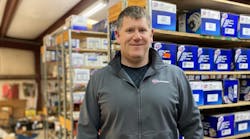Being an automotive jobber store has sure changed throughout the years. Those jobbers that did not adapt with the changing times are gone. That’s not unique to our business. Independent jobbers today are faced with a very complex set of circumstances to deal with, and most of us are coping, adapting and changing.
Independent service and repair facilities also are faced with complexity that surpasses even the jobber stores’ tribulations, but for whatever reason, an alarming percentage of the independent service centers refuse to adopt new technology or take advantage of training. More importantly, they do not readily grasp the importance of informing themselves or their employees how the vast library of knowledge available via various forms, will impact their bottom line.
The rest of the automotive aftermarket is motor-boating along, only to be slowed by the anchor of seeming indifference exemplified by a large number of independent repair shops. Copy this article, and hand it out to your independent repair shops and service centers, because the stories and points I’m about to share might just shame them into getting some new technology or going to a few classes.
A simple query is in order: Why are many independent shops and their technicians not attending classes and training seminars? For my technicians and countermen it’s mandatory. Period, end of discussion. Federal-Mogul just held a regional seminar that we traveled 75 miles to attend. A recent Snap-On Tools Diagnostic seminar required travel of more than 100 miles, and guess how many of my customers that are dealers, repair centers, and garages attended? One. Us. I was not surprised, after all, they are my customers.
I asked one of my larger customers why they didn’t send one tech, just one? The answer was even more astounding, “We’ve got a hand held code reader and the Internet, so all the information we need is available to us for free. We didn’t feel like it would be worth our time, plus if we have a problem we can’t solve, we just ask you.”
I almost snort-laughed, then I asked, “How much time do you spend or your techs waste before you get to the point of calling us? Do you get to bill for all of that time scratching your head? What if I’m too busy to help your techs diagnose the problem?” His retort, “Well we just send them to you or a dealership because you usually can’t make much money on goofy stuff anyhow.” I was speechless, and it takes a very dumbfounding experience for me to be left with nothing to say.
Oil and water don’t mix. Retail parts stores and code readers don’t mix well either. Even worse, the fact that they use code readers openly and freely for many customers furthers the public perception that code readers are magical tools. In fact, the only thing that’s astounding is because retail “code reading” is free, the average Joe will buy copious amounts of things to fix their vehicle that tend to fix nothing. Yet since the scan was free, and the reader said those parts could be the problem, the customer has no problem that the parts cannot be returned.
A good tool in the wrong hands is worse than the wrong tool in good hands. Giving a dentist a hammer and a chisel will still result in a tooth extraction, but possibly a few more than the bad tooth.
Then we have the infomercial guys. They claim that their code readers will save the consumer thousands of dollars because repair shops are diagnosing the wrong thing, or pontificating that average consumers can simply buy the part themselves, and solve the problem in DIY fashion, thus eliminating the need for a qualified repair shop. These infomercials tend to infuriate me because they actually promise consumers that they can save money by using their tool.
This is worse than a retail store scanning your car because an automotive retail employee might actually know the difference between a MAP sensor and a MAF sensor and their purpose in the grand scheme of all things automotive. But it still might not be the problem, and often times it is definitely not the problem.
By the way, one of these infomercials actually displayed the ASE certification logo during its rant about how bypassing garages and service centers will save you thousands. Anyone besides me see that and lose your ever lovin’ mind? I made a phone call about that one.
An often-implied misconception that a large number of repair shops are chop shops and parts swappers might actually be true! I have vehemently defended our repair industry for years and years when I hear consumers argue about getting ripped off. By The Power of Grey Skull, I’ve just laid out a substantial amount of circumstantial prosecutorial evidence that our industry is indeed chock full of ignorant “grease monkeys.”
Even worse, I realized that I’m giving away free diagnostic knowledge that was acquired through years of training and experience, and that possibly gives credence to my customers argument that getting properly educated and trained is not of imminent importance. I’m the man, and some of my customers are the minions. I’m not quite sure how to solve this problem, but I’ve fostered it for years.
Free diagnostic scans at retail stores combined with Internet Google searches, stitched together with a string of blog sites, coupled fashionably by DIY code reader magic boxes. This is what our customers see every day. They are being trained to distrust what professional repair centers do and what many are very good at doing and at a much higher level of success.
If you are ill-trained, lack motivation, never attend any training seminars, and see any educational opportunities as a waste of time, well, you could probably care less or you just don’t know enough to care at all. You “grease monkeys” need to stick to eating bananas and get out of this business. You might share 99 percent of my automotive DNA, but you need more than a prehensile thumb to grasp a tire hammer. In our business, you need a prehensile mind to grasp education and training.
Subscribe to Aftermarket Business World and receive articles like this every month….absolutely free. Click here.

